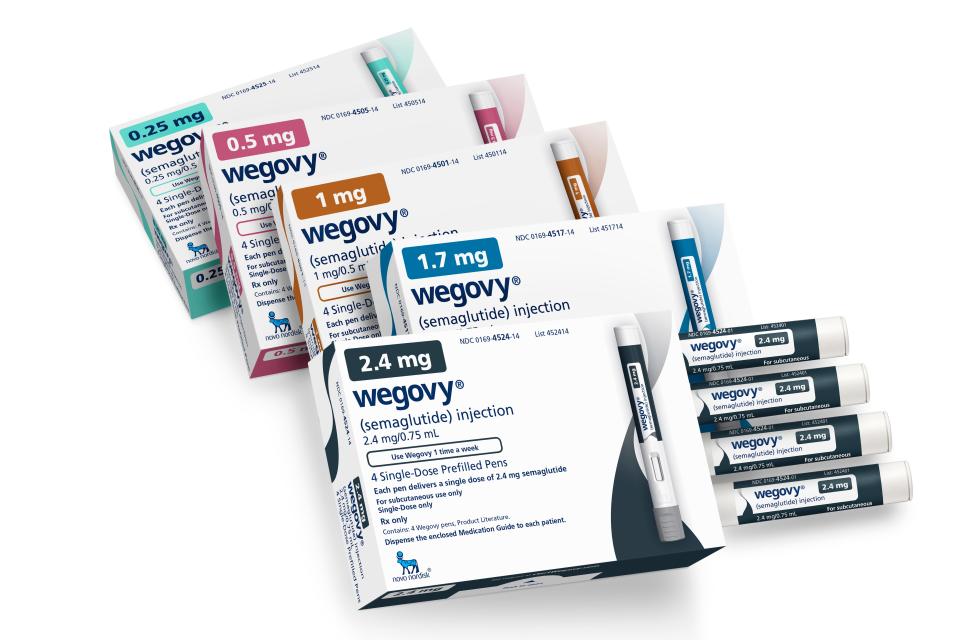'The future is accessibility' Pills for weight loss to soon replace injectables like Wegovy
- Oops!Something went wrong.Please try again later.
The next major innovation coming to weight-loss drugs will be pills with the effectiveness of injectables at potentially far lower costs.
Medications have finally been able to offer the kind of weight loss seen only before with bariatric surgery. But these drugs have several shortcomings, including the lack of long-term safety and effectiveness data, the need for weekly injections and their price tags, which top $1,000 a month and often aren't covered by insurance.
Although probably still several years away, pills could address the second two concerns, experts say.
Pills, technically called oral small molecules, are far easier to manufacture, so they also could address the shortages that have made it hard to access weight loss medications for the past year or more.
"Oral small molecules are really the future," said Raymond Stevens, CEO of Structure Therapeutics, a biotech that is also developing drugs for obesity and diabetes. "The future is accessibility."
Avoiding shots will also make the drugs more acceptable to more people, said Dr. Eric Topol, a cardiologist and founding director of the Scripps Research Translational Institute in La Jolla, California.
But he worries drug companies will try to use the weight loss drugs to make up for profits they lost when the Biden administration recently pressured them into lowering the cost of insulin to $35.
"If they're wise, they'll make it relatively inexpensive," Topol said. "That remains to be seen."
At the American Diabetes Association's annual conference underway in San Diego, several companies presented information about pills they are developing for weight loss, as well as for type 2 diabetes.
Dr. Robert Gabbay, the association's chief scientific and medical officer, said he's eager for weight loss drugs to become available as pills. More than 40% of Americans now meet the definition for having obesity and 70% for being overweight.
"It's gratifying to see that obesity treatment is really moving to the next level," he said. "We have some great tools now and we're looking forward to … widening the arsenal for a condition that affects the majority of Americans."
Details on three new studies
Novo Nordisk, which makes the blockbusters Ozempic for diabetes and Wegovy for weight loss, both based on the same medication generically called semaglutide, presented two new studies on a pill form of the drug.

In one, 334 people who took a dailly 50-gram semaglutide pill every day for nearly a year and a half, lost substantially more weight than an equal number of people who took a placebo.
On average, the people taking semaglutide lost 15% of their body weight, compared with 2.6% for those on the placebo, according to the study, published Monday in the journal The Lancet. One-third of those taking the drug lost 20% of their body weight compared with only 3% of those getting the placebo.
Most people in both groups had side effects, but gastrointestinal side effects were more common in the group that received the drug; 80% reporting such problems compared with 46% in the placebo group.
A separate study looked the effectiveness of a pill form of semaglutide in people with both diabetes and excess weight.
Since 2019, Novo Nordisk has sold a pill form of semaglutide for diabetes called Rybelsus, at 7 mg or 14 mg a day. The new study, published Sunday, also in The Lancet, finds doses well above that provide more weight loss and better glucose control without substantially increasing side effects in people with diabetes who also are considered overweight.
At Rybelsus doses, one-third to one-half of people do not achieve appropriate diabetes control, studies have shown. But at 25 mg taken daily for nearly a year and a half, 51% of participants achieved effective control, and at 50 mg, 63% did, the new study showed.

More people also lost 5% to 10% of their body weight on the higher doses. Side effects, most of them gastrointestinal, increased from 76% to 80% of participants from the lowest to the highest dose.
Separately, in an announcement Monday, drugmaker Pfizer said it would advance its experimental pill danuglipron for diabetes and continue considering it for obesity.
Pfizer is studying danuglipron in a 1,400-person trial for the treatment of both obesity and type 2 diabetes, as well as a smaller study in patients with obesity but not diabetes, which it expects to complete by the end of the year.
Right now, danuglipron is designed to be taken twice a day, but the company is developing a once-a-day version.
A study published earlier this year in the Journal of American Medical Association Network Open showed the drug was effective for people with diabetes with comparable side effects to the current injectable weight-loss drugs. Once studies are completed, spokesperson Jerica Pitts said, the company will decide whether to pursue the drug for both diabetes and weight loss.
Contact Karen Weintraub at kweintraub@usatoday.com.
Health and patient safety coverage at USA TODAY is made possible in part by a grant from the Masimo Foundation for Ethics, Innovation and Competition in Healthcare. The Masimo Foundation does not provide editorial input.
This article originally appeared on USA TODAY: New weight loss pills may soon arrive as cheaper alternative

